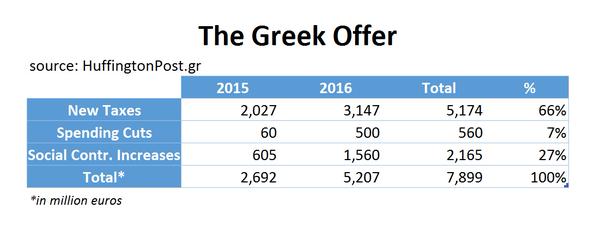I detest writing about Greece. I suggested back in 2010 that the best outcome was default, which would have been the most likely outcome of a no-bailouts approach.
And for the past five years, events have confirmed – over and over again – that this was the right approach.
So you can understand how frustrating it is to comment again on this issue.
But sometimes the policy proposals from national governments and international bureaucracies are so blindly insane that I feel compelled to restate obvious points.
Consider what is happening now. The various members of the Troika (the International Monetary Fund, the European Commission, and the European Central Bank) are pressuring Greece to make reforms in exchange for additional subsidies, handouts, and bailouts.
But since the Greek government is run by lunatics, the net result of “reforms” is more and more bad policy. To be blunt, the Troika crowd is subsidizing and encouraging a process that is resulting in suicidal tax hikes in Greece.
Here are some excerpts from a story in the EU Observer.
Greece edged closer to a last-ditch agreement with her eurozone creditors on Monday (22 June), after Alexis Tsipras’ government promised to raise an extra €8 billion over the next two years. Under the proposal submitted to eurozone ministers, the Greek government would raise just under €2.7 billion in extra revenue this year, followed by a further €5.2 billion in 2016. …Tsipras’ government has proposed to raise €645 million over the next two years by increasing health contributions to 5 percent. …As expected, the remaining proposals are almost exclusively based around new tax increases, the most significant of which is a new 12 percent levy on all corporate profits over €500,000, which the Greek government expects to bring in €1.35 billion in extra revenue. …together with €100 million per year from a new TV advertisements tax. It also wants to widen the scope of a so-called ‘luxury’ tax to cover private swimming pools, planes and boats.
Here’s a look at the breakdown of the new deal, which I got off Twitter from a pro-liberty Greek citizen (i.e., an endangered species).

So the latest deal is 93 percent tax hikes and 7 percent spending cuts. And I’m sure those so-called spending cuts are probably make-believe reductions in previously planned increases instead of genuine reductions.
That’s so imbalanced that it makes President George H.W. Bush’s disastrous 1990 tax-hike deal seem good by comparison.
And just in case you wonder whether there’s no fat in the Greek budget, consider this shocking sentence from the EU Observer story.
Public spending on pensions currently amounts to 16 percent of Greece’s GDP.
To give you an idea of how crazy that number is, Social Security outlays in the United States consume “only” 4.9 percent of GDP.
And don’t forget the Greeks also squander money on a bloated bureaucracyand a preposterous regulatory regime (click here and here to see I’m actually understating the problem).
Yet rather than change any of these anti-growth policies, the government wants more and more revenue to prop up a bloated government.
The bottom line is that Greek politicians and interest groups are trying to impose an upside-down version of my Golden Rule.
But while my Rule says that the private sector should grow faster than the government, their version is that the tax burden should grow faster than the private sector.
Needless to say, that’s an approach that is guaranteed to produce economic ruin.
Productive people leave the country or operate in the underground economy. And many others decide that it’s far more comfortable to climb into the wagon of government dependency.
The situation is utterly ludicrous, as explained by George Will.
…a nation that chooses governments committed to Rumpelstiltskin economics, the belief that the straw of government largesse can be spun into the gold of national wealth? Tsipras…thinks Greek voters, by making delusional promises to themselves, obligate other European taxpayers to fund them.
But George sees a silver lining to the dark cloud of Greece’s economic illiteracy.
Greeks bearing the gift of confirmation that Margaret Thatcher was right about socialist governments: “They always run out of other people’s money.” …This protracted dispute will result in desirable carnage if Greece defaults, thereby becoming a constructively frightening example to all democracies doling out unsustainable, growth-suppressing entitlements. …It cannot be said too often: There cannot be too many socialist smashups. The best of these punish reckless creditors whose lending enables socialists to live, for a while, off of other people’s money.
I fully agree with this final point. Just like it’s good to have positive examples (think Hong Kong, Switzerland, Texas, or Singapore), it’s also good to have bad examples (such as France, Italy, California, and Illinois).
Though it’s unclear whether politicians even care about learning any lessons.

